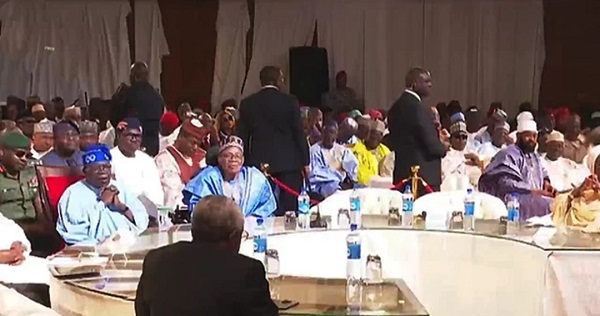At his book launch after three decades of controversial annulment of June 12, 1993, presidential election, Nigeria’s former Head of State, Ibrahim Babangida, admitted for the first time that the late philanthropist and democracy hero Moshood Kashimawo Olawale (MKO) Abiola won the election.
The startling revelation was contained in Babangida’s 420-page memoir titled, ‘A Journey in Service: An Autobiography of Ibrahim Babangida’ which was launched in Abuja on Thursday with continental and national dignitaries in attendance.
The book reviewer, former Vice President Yemi Osinbajo, said the “evil genius” and “Maradona” as Babangida was nicknamed answered the question as to whether Abiola won the June 12 election or not in his book.
“Although I am on record to have stated after the election that Abiola may not have won the election, upon further reflection, and a closer examination of all available facts, particularly the detailed election results which are published as an appendix to this book, there was no doubt that MKO Abiola won the June 12 elections,” Babangida admitted in his book.
“Upon closer examination of the original collated figure from the 110 polling booths nationwide, it was clear that he satisfied the two main requirements for winning the presidential election – mainly majority votes and geographical spread – having obtained 8,128,720 against Tofa’s 5,848,247 votes and securing the mandatory of one-third of the votes cast in 28 states of the Federation including Abuja.”
During his address, Babangida, famously known as IBB, told the gathering that the annulment of the poll was in “extreme national interest”.
“As the leader of the military administration, I accept full responsibility for all decisions taken by me. And June 12 happened under my watch. Mistakes, oversights, and missteps happen in quick succession but I say in my book, in all matters, we acted in extreme national interest so that Nigeria could survive,” he said.
The return of democracy in Nigeria in 1999 followed a series of events, some bloody and undesirable. In 1993, Babangida who took over power in 1985 through a coup against General Muhammadu Buhari backed the transition to civil rule with the 1993 presidential election. He would later cancel the poll and resign in the wake of the protests and unrest that followed.
Babangida subsequently formed an interim government with businessman Ernest Sonekan as president and Sani Abacha as Chief of Defence Staff and Minister of Defence. On November 18, 1993, three months into his administration, Abacha overthrew Sonekan in a palace coup.
The annulment of the June 12, 1993, presidential election between Abiola of the Social Democratic Party (SDP) and his main challenger Bashir Tofa of the National Republican Convention (NRC) sparked protests and unrest nationwide.
Buoyed by the incontrovertible evidence of his electoral victory, Abiola declared himself as president. He was not only denied his mandate but was subsequently imprisoned by the military regime of Sani Abacha who was Babangida’s chief of defence staff.
The political colossus died in troubling and deeply suspicious circumstances in detention on July 7, 1998. He was 60 years old. One of his wives, Kudirat, was viciously assassinated on June 4, 1996.
After the death of Abacha, General Abdulsalami Abubakar took over power and midwived the transition to democratic rule with former head of state Obasanjo winning the presidential election on the platform of the Peoples Democratic Party (PDP), signalling the democratic era known as the Fourth Republic. Obasanjo was first military head of state between February 1976 and October 1979 before becoming the country’s democratically elected President between 1999 and 2007.
For decades, the credibility or otherwise of the poll has dominated political discussions with pro-democracy movement National Democratic Coalition (NADECO) and regional socio-political group Afenifere relentlessly demanding a remedy for the “injustice” done to the Abiolas and the Yoruba people of the South-West zone of Nigeria.
As a sort of remedy or compensation, in 2018, then President Muhammadu Buhari moved Democracy Day from May 29 to June 12 in honour of Abiola and to remind all Nigerians of one of the freest elections in the nation’s history. The day is to celebrate the ideals of democracy since the beginning of the Fourth Republic 25 years ago.
Babangida, in his memoir, said he was gratified that Buhari recognised Abiola as a former head of state.
“Looking back now, the June 12 saga was undeniably the most challenging moment of my life and in certain respects, one of the most painful. If I had to do it all over again, I would do it differently,” he stated.
The book launch has some of the most decorated men in attendance including former Presidents and Heads of State Goodluck Jonathan, Yakubu Gowon, and Abdulsalami Abubakar as well as former Vice Presidents Atiku Abubakar and Namadi Sambo.
President Bola Tinubu and Vice President Kashim Shettima were also present. Billionaire businesspersons including Aliko Dangote, Abdulsamad Rabiu, and Folorunsho Alakija, among others, were not left out of the roll call of the who’s who.
While former President Muhammadu Buhari was represented at the event, Obasanjo was conspicuously absent from the book launch. Ghana’s former President Nana Akufo-Addo was also spotted at the event.


Comment here